九年级 Unit 9 I like music that I can dance to. Section B(2a-2e)课件(共26张PPT,内嵌视频)
文档属性
| 名称 | 九年级 Unit 9 I like music that I can dance to. Section B(2a-2e)课件(共26张PPT,内嵌视频) |  | |
| 格式 | pptx | ||
| 文件大小 | 45.5MB | ||
| 资源类型 | 教案 | ||
| 版本资源 | 人教新目标(Go for it)版 | ||
| 科目 | 英语 | ||
| 更新时间 | 2024-11-28 18:13:22 | ||
图片预览


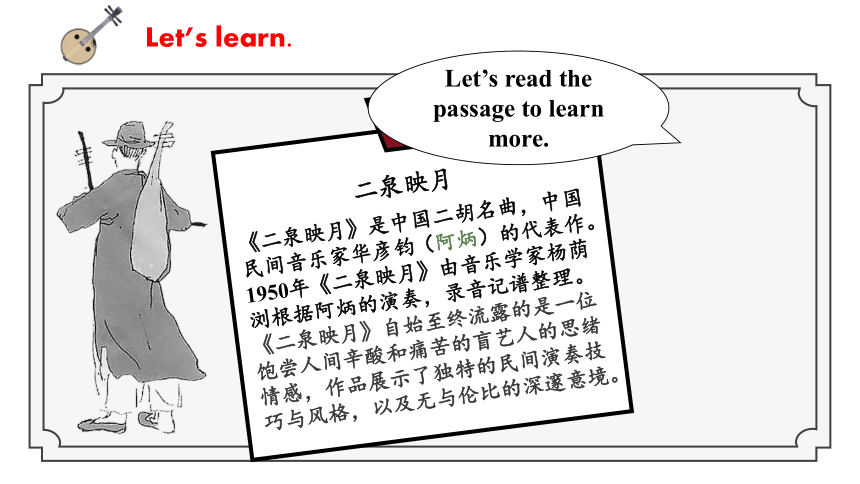
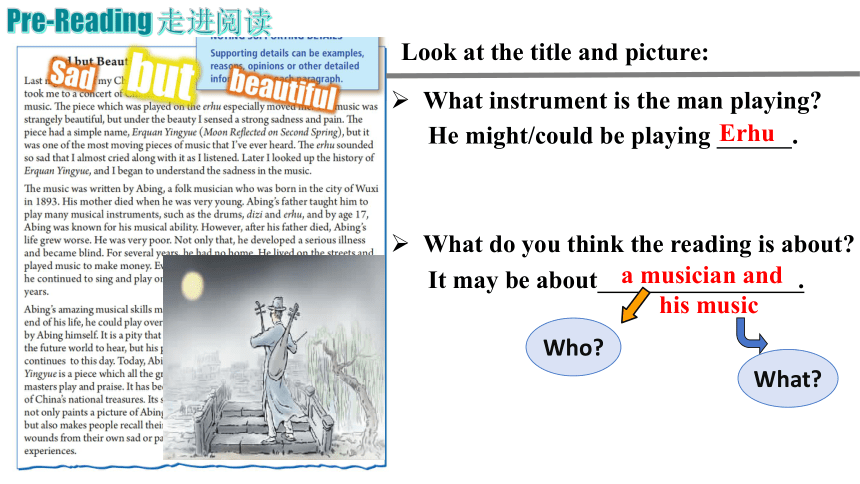
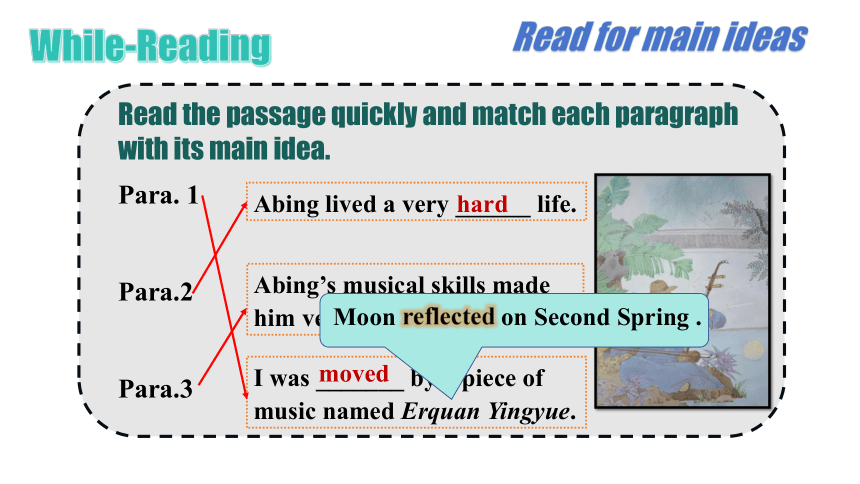
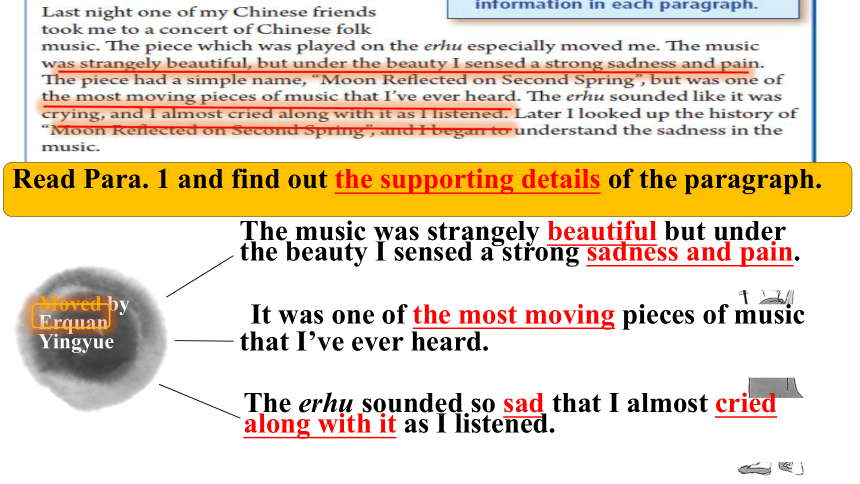
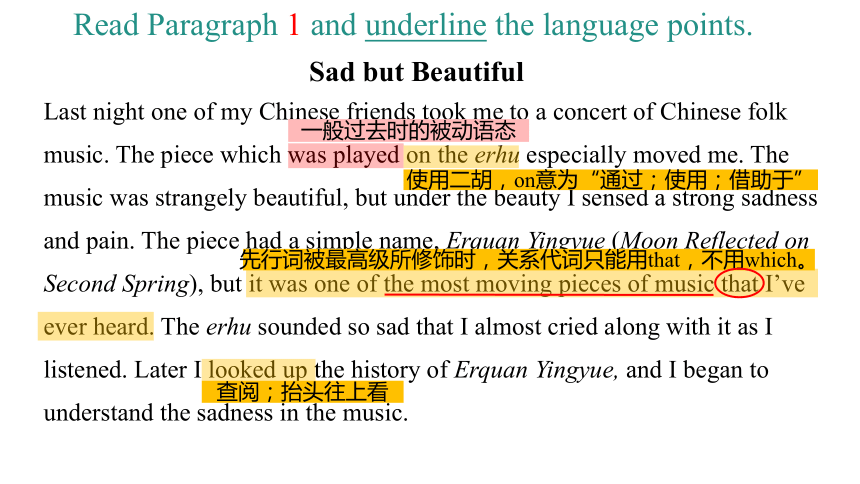
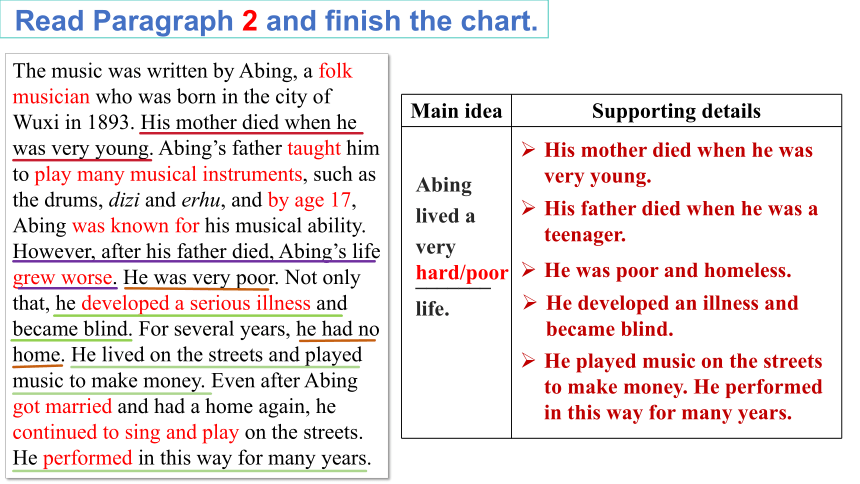

文档简介
(共26张PPT)
Sad but Beautiful
Unit 9
Section B 2a-2e
Let’s enjoy a piece of music.
What do you feel about this piece of music
sad
beautiful
painful
Let’s learn.
二泉映月
《二泉映月》是中国二胡名曲,中国民间音乐家华彦钧(阿炳)的代表作。1950年《二泉映月》由音乐学家杨荫浏根据阿炳的演奏,录音记谱整理 。
《二泉映月》自始至终流露的是一位饱尝人间辛酸和痛苦的盲艺人的思绪情感,作品展示了独特的民间演奏技巧与风格,以及无与伦比的深邃意境。
Let’s read the passage to learn more.
Look at the title and picture:
What instrument is the man playing
He might/could be playing .
What do you think the reading is about
It may be about .
a musician and
his music
Erhu
Who
What
Sad
but
beautiful
Pre-Reading 走进阅读
While-Reading
I was _______ by a piece of
music named Erquan Yingyue.
Abing lived a very ______ life.
Abing’s musical skills made
him very __________.
Para. 1
Para.2
Para.3
moved
hard
popular
Read the passage quickly and match each paragraph with its main idea.
Moon reflected on Second Spring .
Read for main ideas
Read Para. 1 and find out the supporting details of the paragraph.
Moved by Erquan Yingyue
The music was strangely beautiful but under the beauty I sensed a strong sadness and pain.
It was one of the most moving pieces of music that I’ve ever heard.
The erhu sounded so sad that I almost cried along with it as I listened.
Last night one of my Chinese friends took me to a concert of Chinese folk music. The piece which was played on the erhu especially moved me. The music was strangely beautiful, but under the beauty I sensed a strong sadness and pain. The piece had a simple name, Erquan Yingyue (Moon Reflected on Second Spring), but it was one of the most moving pieces of music that I’ve ever heard. The erhu sounded so sad that I almost cried along with it as I listened. Later I looked up the history of Erquan Yingyue, and I began to understand the sadness in the music.
Read Paragraph 1 and underline the language points.
Sad but Beautiful
一般过去时的被动语态
使用二胡,on意为“通过;使用;借助于”
先行词被最高级所修饰时,关系代词只能用that,不用which。
查阅;抬头往上看
Main idea Supporting details
His mother died when he was very young.
His father died when he was a teenager.
He was poor and homeless.
He developed an illness and became blind.
He played music on the streets to make money. He performed in this way for many years.
Abing lived a very _______ life.
hard/poor
Read Paragraph 2 and finish the chart.
The music was written by Abing, a folk musician who was born in the city of Wuxi in 1893. His mother died when he was very young. Abing’s father taught him to play many musical instruments, such as the drums, dizi and erhu, and by age 17, Abing was known for his musical ability. However, after his father died, Abing’s life grew worse. He was very poor. Not only that, he developed a serious illness and became blind. For several years, he had no home. He lived on the streets and played music to make money. Even after Abing got married and had a home again, he continued to sing and play on the streets. He performed in this way for many years.
Read Para. 2 and fill in the blanks.
In 1893
Abing was ________ in the city of Wuxi.
When he was very _________
His mother _______. His father taught him to play many _________________.
At the age of _______
Abing was known for his _______________.
born
young
died
musical instruments
17
musical ability
Read Para. 2 and fill in the blanks.
After his father ______
Abing’s life grew _______. He was very poor. Besides, he developed a serious ________ and became ________.
For _________ years
He lived on the ________ and played music to ______________.
After he got _________ and had a home again
He continued to ________ and _______ on the streets.
worse
died
illness
blind
streets
make money
several
married
sing
play
In 1893,
Abing was born.
His mother ______, when he was________.
At the age of 17, Abing was known for his musical ability.
For several years, he had __________, and lived _____________.
After _________ died, Abing’s life _________
He was_________and
became______.
died
grew worse.
no home
on the streets
He _________ in this way
for many years.
performed
blind
young
his father
very poor
Try to retell Paragraph 2.
Did Abing become popular
The music was written by Abing, a folk musician who was born in the city of Wuxi in 1893. His mother died when he was very young. Abing’s father taught him to play many musical instruments, such as the drums, dizi and erhu, and by age 17, Abing was known for his musical ability. However, after his father died, Abing’s life grew worse. He was very poor. Not only that, he developed a serious illness and became blind. For several years, he had no home. He lived on the streets and played music to make money. Even after Abing got married and had a home again, he continued to sing and play on the streets. He performed in this way for many years.
民间音乐家
弹奏多种乐器
到17岁
继续唱歌、表演
得了一种严重的疾病
因……而出名
Read Paragraph 2 and underline the language points.
What do you think of Abing
from Para 2
pitiful
(可怜的)
talented in music
has love for life and music
a strong-mind man
Role-play
Imagine you are Abing , tell your experiences to people.
While-Reading
List the supporting details of Para 3.
Read for details
Main idea Supporting details
Abing’s musical skills made him very popular.
◆ He could play ______________, and he wrote many of them himself.
◆ Erquan Yingyue is still played and praised by _______________________ today.
◆ Erquan Yingyue has become ________
_______________________.
over 600 pieces
all the great erhu masters
one of
China’s national treasures
Great
Achievements
Abing’s amazing musical skills made him very popular during his lifetime. By the end of his life, he could play over 600 pieces of music. Many of these were written by Abing himself. It is a pity that only six pieces of music in total were recorded for the future world to hear, but his popularity continues to this day. Today, Abing’s Erquan Yingyue is a piece which all the great erhu masters play and praise. It has become one of China’s national treasures. Its sad beauty not only paints a picture of Abing’s own life but also makes people recall their deepest wounds from their own sad or painful experiences.
在他的有生之年
总共
成了中国民族瑰宝之一
描绘了阿炳自己的生活
悲伤或痛苦的经历
Read Paragraph 3 and underline the language points.
1. take sb to a concert
2. Chinses folk music
3. strangely beautiful
4. sense a strong sadness and pain
5. one of the most moving pieces
6. cry along with
7. look up the histroy of
8. a folk musician
9. be born in
10. teach sb to do
11. play musical instrument
12. by age 17
13. develop a serious illness
14. become blind
1. 带某人去听音乐会
2. 中国民族音乐
3. 异常优美
4.感觉到强烈的悲伤和痛苦
5. 最动人的乐曲之一
6. 随着……掉泪/哭泣
7. 查阅……的历史
8. 一位民间音乐家
9. 出生于
10. 教某人做
11. 演奏乐器
12. 到17岁
13. 患重疾
14. 失明
Summary
15. have no home=homeless
16. make money
17. get married
18. continue to do
19. in this way
20. during one’s lifetime
21. by the end of
22. It's a pity that...
23. in total
24. China's natinal treasure
25. not only...but also
15.无家可归
16. 赚钱
17. 结婚
18. 继续做
19. 以这种方式
20. 在某人的一生中
21. 在结束前
22. 遗憾的是
23. 总共
24. 中国的国宝
25. 不但而且
talented in music
deep love for life and music
a strong-mind man
Step 4 Post-reading(超越阅读)——Disscussion
a poor blind man
a popular musician
positive attitude
never give up
amazing musical skills
Its sad beauty not only paints a picture of Abing’s own life, but also makes people recall their deepest wounds from their own sad and painful experiences.
它的凄美不仅描绘了一幅阿炳自己的生活画卷,也让人们回忆起自己悲痛的经历所带来的最深色伤痛。
Why is the music sad but beautiful
1. Its sad beauty not only … but also
makes people recall ...
2. Abing’s hard life
3. Abing’s musical skills
4. Erhu itself
Complete the ID card according to the passage.
ID Card Name: __________ Time of birth: ___________
Hometown: _________ Profession: ______________
The number of pieces he could play: ________________ Musical instruments: _____________________________ The most famous piece : ________________________ Important events: (1) His mother died when he ________________; (2) He developed a ________________ and became _________ after his father died; (3) He lived on the streets and played music to make money for ______________. Abing
1893
Wuxi
folk musician
over 600 pieces
Erquan Yingyue
was very young
serious illness
blind
many years
drums, dizi and erhu
Retell
Erquan Yingyue
Abing
Abing's achievement
strangly beautiful ——
a strong sadness and pain—
one of the moving ——
so sad that almost cried ——
look up —— understand
his mother died——
his father died ——
become blind——
had no home ——
lived on the streets——
played music to make money——
got married—
continue to sing and play
over 600 pieces——
his popularity——
the great erhu masters——
one of China's national treasures
a picture
recall
Writing
Suppose Sydney Opera House will hold concerts of Chinese folk music , could you design a ticket to Abing's concert
Exercises: 用所给单词的适当形式填空。
1. The woman used to live a _______ (pain) life in the country.
2. Sandy, did you sense a strong ___________ (sad) from the music
3. At first, we didn’t think it was a ___________ (move) movie.
4. The children ____________ (perform) a classical dance for the old people.
5. These old photos made me ______ (recall) my happy childhood.
6.Would you mind _________ (shut) the door It’s too cold outside.
7.The young people had a _________ (pain) experience at the age of 15.
8. This is a move that__________ (praise) by many people.
9. Zhang Yimou is a famous _________ (direct) in China.
painful
sadness
moving
performed
recall
shutting
painful
is praised
director
1. —What do you think of the film you saw yesterday
— Oh! It’s one of ______ films I’ve ever seen.
A. interesting B. more interesting
C. most interesting D. the most interesting
2. Many people have to ______ the meaning of this word in the dictionary.
A. look up B. look in C. look at D. look after
3. The book is expensive. ______, it’s worth it.
A. Therefore B. But C. However D. Otherwise
4. Nowadays, many people prefer to eat out on New Year’s Day, ______kids.
A. specially B. especially C. only D. probably
Exercises:根据汉语意思完成下列句子。
1. 这个博物馆里总共有200个参观者。
There are two hundred visitors ________ in the museum.
2. 你能帮我在词典里查一下这个单词吗?
Can you help me ________ the word in the dictionary
3.阿炳的大多数作品没有被录制下来,真是太遗憾了!
________________ most of Abing’s pieces weren’t recorded.
in total
look up
It is a pity that
Sad but Beautiful
Unit 9
Section B 2a-2e
Let’s enjoy a piece of music.
What do you feel about this piece of music
sad
beautiful
painful
Let’s learn.
二泉映月
《二泉映月》是中国二胡名曲,中国民间音乐家华彦钧(阿炳)的代表作。1950年《二泉映月》由音乐学家杨荫浏根据阿炳的演奏,录音记谱整理 。
《二泉映月》自始至终流露的是一位饱尝人间辛酸和痛苦的盲艺人的思绪情感,作品展示了独特的民间演奏技巧与风格,以及无与伦比的深邃意境。
Let’s read the passage to learn more.
Look at the title and picture:
What instrument is the man playing
He might/could be playing .
What do you think the reading is about
It may be about .
a musician and
his music
Erhu
Who
What
Sad
but
beautiful
Pre-Reading 走进阅读
While-Reading
I was _______ by a piece of
music named Erquan Yingyue.
Abing lived a very ______ life.
Abing’s musical skills made
him very __________.
Para. 1
Para.2
Para.3
moved
hard
popular
Read the passage quickly and match each paragraph with its main idea.
Moon reflected on Second Spring .
Read for main ideas
Read Para. 1 and find out the supporting details of the paragraph.
Moved by Erquan Yingyue
The music was strangely beautiful but under the beauty I sensed a strong sadness and pain.
It was one of the most moving pieces of music that I’ve ever heard.
The erhu sounded so sad that I almost cried along with it as I listened.
Last night one of my Chinese friends took me to a concert of Chinese folk music. The piece which was played on the erhu especially moved me. The music was strangely beautiful, but under the beauty I sensed a strong sadness and pain. The piece had a simple name, Erquan Yingyue (Moon Reflected on Second Spring), but it was one of the most moving pieces of music that I’ve ever heard. The erhu sounded so sad that I almost cried along with it as I listened. Later I looked up the history of Erquan Yingyue, and I began to understand the sadness in the music.
Read Paragraph 1 and underline the language points.
Sad but Beautiful
一般过去时的被动语态
使用二胡,on意为“通过;使用;借助于”
先行词被最高级所修饰时,关系代词只能用that,不用which。
查阅;抬头往上看
Main idea Supporting details
His mother died when he was very young.
His father died when he was a teenager.
He was poor and homeless.
He developed an illness and became blind.
He played music on the streets to make money. He performed in this way for many years.
Abing lived a very _______ life.
hard/poor
Read Paragraph 2 and finish the chart.
The music was written by Abing, a folk musician who was born in the city of Wuxi in 1893. His mother died when he was very young. Abing’s father taught him to play many musical instruments, such as the drums, dizi and erhu, and by age 17, Abing was known for his musical ability. However, after his father died, Abing’s life grew worse. He was very poor. Not only that, he developed a serious illness and became blind. For several years, he had no home. He lived on the streets and played music to make money. Even after Abing got married and had a home again, he continued to sing and play on the streets. He performed in this way for many years.
Read Para. 2 and fill in the blanks.
In 1893
Abing was ________ in the city of Wuxi.
When he was very _________
His mother _______. His father taught him to play many _________________.
At the age of _______
Abing was known for his _______________.
born
young
died
musical instruments
17
musical ability
Read Para. 2 and fill in the blanks.
After his father ______
Abing’s life grew _______. He was very poor. Besides, he developed a serious ________ and became ________.
For _________ years
He lived on the ________ and played music to ______________.
After he got _________ and had a home again
He continued to ________ and _______ on the streets.
worse
died
illness
blind
streets
make money
several
married
sing
play
In 1893,
Abing was born.
His mother ______, when he was________.
At the age of 17, Abing was known for his musical ability.
For several years, he had __________, and lived _____________.
After _________ died, Abing’s life _________
He was_________and
became______.
died
grew worse.
no home
on the streets
He _________ in this way
for many years.
performed
blind
young
his father
very poor
Try to retell Paragraph 2.
Did Abing become popular
The music was written by Abing, a folk musician who was born in the city of Wuxi in 1893. His mother died when he was very young. Abing’s father taught him to play many musical instruments, such as the drums, dizi and erhu, and by age 17, Abing was known for his musical ability. However, after his father died, Abing’s life grew worse. He was very poor. Not only that, he developed a serious illness and became blind. For several years, he had no home. He lived on the streets and played music to make money. Even after Abing got married and had a home again, he continued to sing and play on the streets. He performed in this way for many years.
民间音乐家
弹奏多种乐器
到17岁
继续唱歌、表演
得了一种严重的疾病
因……而出名
Read Paragraph 2 and underline the language points.
What do you think of Abing
from Para 2
pitiful
(可怜的)
talented in music
has love for life and music
a strong-mind man
Role-play
Imagine you are Abing , tell your experiences to people.
While-Reading
List the supporting details of Para 3.
Read for details
Main idea Supporting details
Abing’s musical skills made him very popular.
◆ He could play ______________, and he wrote many of them himself.
◆ Erquan Yingyue is still played and praised by _______________________ today.
◆ Erquan Yingyue has become ________
_______________________.
over 600 pieces
all the great erhu masters
one of
China’s national treasures
Great
Achievements
Abing’s amazing musical skills made him very popular during his lifetime. By the end of his life, he could play over 600 pieces of music. Many of these were written by Abing himself. It is a pity that only six pieces of music in total were recorded for the future world to hear, but his popularity continues to this day. Today, Abing’s Erquan Yingyue is a piece which all the great erhu masters play and praise. It has become one of China’s national treasures. Its sad beauty not only paints a picture of Abing’s own life but also makes people recall their deepest wounds from their own sad or painful experiences.
在他的有生之年
总共
成了中国民族瑰宝之一
描绘了阿炳自己的生活
悲伤或痛苦的经历
Read Paragraph 3 and underline the language points.
1. take sb to a concert
2. Chinses folk music
3. strangely beautiful
4. sense a strong sadness and pain
5. one of the most moving pieces
6. cry along with
7. look up the histroy of
8. a folk musician
9. be born in
10. teach sb to do
11. play musical instrument
12. by age 17
13. develop a serious illness
14. become blind
1. 带某人去听音乐会
2. 中国民族音乐
3. 异常优美
4.感觉到强烈的悲伤和痛苦
5. 最动人的乐曲之一
6. 随着……掉泪/哭泣
7. 查阅……的历史
8. 一位民间音乐家
9. 出生于
10. 教某人做
11. 演奏乐器
12. 到17岁
13. 患重疾
14. 失明
Summary
15. have no home=homeless
16. make money
17. get married
18. continue to do
19. in this way
20. during one’s lifetime
21. by the end of
22. It's a pity that...
23. in total
24. China's natinal treasure
25. not only...but also
15.无家可归
16. 赚钱
17. 结婚
18. 继续做
19. 以这种方式
20. 在某人的一生中
21. 在结束前
22. 遗憾的是
23. 总共
24. 中国的国宝
25. 不但而且
talented in music
deep love for life and music
a strong-mind man
Step 4 Post-reading(超越阅读)——Disscussion
a poor blind man
a popular musician
positive attitude
never give up
amazing musical skills
Its sad beauty not only paints a picture of Abing’s own life, but also makes people recall their deepest wounds from their own sad and painful experiences.
它的凄美不仅描绘了一幅阿炳自己的生活画卷,也让人们回忆起自己悲痛的经历所带来的最深色伤痛。
Why is the music sad but beautiful
1. Its sad beauty not only … but also
makes people recall ...
2. Abing’s hard life
3. Abing’s musical skills
4. Erhu itself
Complete the ID card according to the passage.
ID Card Name: __________ Time of birth: ___________
Hometown: _________ Profession: ______________
The number of pieces he could play: ________________ Musical instruments: _____________________________ The most famous piece : ________________________ Important events: (1) His mother died when he ________________; (2) He developed a ________________ and became _________ after his father died; (3) He lived on the streets and played music to make money for ______________. Abing
1893
Wuxi
folk musician
over 600 pieces
Erquan Yingyue
was very young
serious illness
blind
many years
drums, dizi and erhu
Retell
Erquan Yingyue
Abing
Abing's achievement
strangly beautiful ——
a strong sadness and pain—
one of the moving ——
so sad that almost cried ——
look up —— understand
his mother died——
his father died ——
become blind——
had no home ——
lived on the streets——
played music to make money——
got married—
continue to sing and play
over 600 pieces——
his popularity——
the great erhu masters——
one of China's national treasures
a picture
recall
Writing
Suppose Sydney Opera House will hold concerts of Chinese folk music , could you design a ticket to Abing's concert
Exercises: 用所给单词的适当形式填空。
1. The woman used to live a _______ (pain) life in the country.
2. Sandy, did you sense a strong ___________ (sad) from the music
3. At first, we didn’t think it was a ___________ (move) movie.
4. The children ____________ (perform) a classical dance for the old people.
5. These old photos made me ______ (recall) my happy childhood.
6.Would you mind _________ (shut) the door It’s too cold outside.
7.The young people had a _________ (pain) experience at the age of 15.
8. This is a move that__________ (praise) by many people.
9. Zhang Yimou is a famous _________ (direct) in China.
painful
sadness
moving
performed
recall
shutting
painful
is praised
director
1. —What do you think of the film you saw yesterday
— Oh! It’s one of ______ films I’ve ever seen.
A. interesting B. more interesting
C. most interesting D. the most interesting
2. Many people have to ______ the meaning of this word in the dictionary.
A. look up B. look in C. look at D. look after
3. The book is expensive. ______, it’s worth it.
A. Therefore B. But C. However D. Otherwise
4. Nowadays, many people prefer to eat out on New Year’s Day, ______kids.
A. specially B. especially C. only D. probably
Exercises:根据汉语意思完成下列句子。
1. 这个博物馆里总共有200个参观者。
There are two hundred visitors ________ in the museum.
2. 你能帮我在词典里查一下这个单词吗?
Can you help me ________ the word in the dictionary
3.阿炳的大多数作品没有被录制下来,真是太遗憾了!
________________ most of Abing’s pieces weren’t recorded.
in total
look up
It is a pity that
同课章节目录
- Unit 1 How can we become good learners.
- Section A
- Section B
- Unit 2 I think that mooncakes are delicious!
- Section A
- Section B
- Unit 3 Could you please tell me where the restroom
- Section A
- Section B
- Unit 4 I used to be afraid of the dark.
- Section A
- Section B
- Unit 5 What are the shirts made of?
- Section A
- Section B
- Review of Units 1-5
- Unit 6 When was it invented?
- Section A
- Section B
- Unit 7 Teenagers should be allowed to choose their
- Section A
- Section B
- Unit 8 It must belong to Carla.
- Section A
- Section B
- Unit 9 I like music that I can dance to.
- Section A
- Section B
- Unit 10 You're supposed to shake hands.
- Section A
- Section B
- Review of Units 6-10
- Unit 11 Sad movies make me cry.
- Section A
- Section B
- Unit 12 Life is full of the unexpected
- Section A
- Section B
- Unit 13 We're trying to save the earth!
- Section A
- Section B
- Unit 14 I remember meeting all of you in Grade 7.
- Section A
- Section B
- Review of Units 11-14
